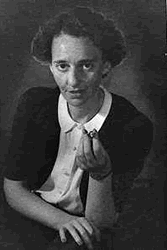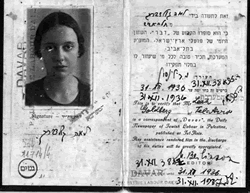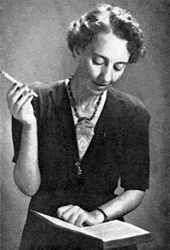Lea Goldberg (1911-1970)
Hebrew poet
Born in Kovno, Lithuania,(in other sources: Konigsberg, East Prussia now Kaliningrad, Russia), Lea Goldberg studied at Lithuanian and German universities, receiving her Ph.D. in 1933. She came on aliyah in 1935 where she worked as a literary adviser to Habimah theater and as an editor for Sifriyat Poalim books. She became a lecturer in literature at the Hebrew University in 1954.
Her poems are known for their melancholy subjects with positive messages. Her themes include wounded love as well as a yearning for love and light. Her work is marked by an aesthetic intellectualism bordering on modernism.
In addition to her poems, she wrote poems for children, a novel, a play and was responsible for translating a number of Russian and French masters into Hebrew
L-GOLDBERG-300
from another source http://www.ithl.org.il/author_info.asp?id=98; Leah Goldberg (1911-1970) was born in Konigsberg, East Prussia (now Kaliningrad, Russia), and started writing Hebrew verse as a schoolgirl in Kovno. She received a Ph.D in semitic languages from Bonn University, and immigrated to pre-state Israel in 1935. Goldberg was a renowned poet -a member of the Shlonsky group -as well as a successful children`s author, theater critic, translator, and editor. In 1952, she established the Department of Comparative Literature at the Hebrew University of Jerusalem, and remained its chairperson until her death. Goldberg published nine books of poetry, two novels, three plays, six books of non-fiction, and 20 books for children. Goldberg was awarded many prizes, including the Israel Prize for Literature in 1970.
Books Published in Hebrew
Selected
Smoke Rings (poetry), Iachdav, 1935 [Taba`ot Ashan]
Letters from an Imaginary Journey, (novel), Davar, 1937; Sifriat Poalim, 2007 [Michtavim Mi-Nesiah Medumah]
Green-Eyed Spike (poetry), Dfus Hanakdan, 1940 [Shibolet Yerukat Ha-Ayin]
Songs in the Villages (poetry), Dfus Hanakdan, 1942 [Shir Ba-Kefarim]
From My Old Home (poetry), Sifriat Poalim, 1942 [Mi-Beiti Ha-Yashan]
There Comes the Light (novel), Sifriat Poalim, 1946, 1994; Hakibbutz Hameuchad, 2005 [Ve-Hu Ha-Or]
Of Bloom (poetry), Sifriat Poalim, 1948 [Al Ha-Prihah]
Samson `s Love (poetry), Mikra-Studio, 1952 [Ahavat Shimshon]
Encounter with a Poet (non-fiction), Sifriat Poalim, 1952 [Pegisha Im Meshorer]
Morning Lightning (poetry), Sifriat Poalim, 1955 [Barak Ba-Boker]
The Lady of the Castle (play), Sifriat Poalim, 1956 [Ba`alat Ha-Armon]
Sooner or Later (poetry), Sifriat Poalim, 1959 [Mukdam Ve-Meuhar]
This Night (poetry), Sifriat Poalim, 1964 [Im Ha-Laila Ha-Ze]
Collected Poems (poetry), Iachdav/Writers Association, 1970 [Yalkut Shirim]
The Rest of Life (poetry), Sifriat Poalim, 1971 [She`erit Ha-Hayim]
Letters and Diary, Massada, 1978 [Michtavim Ve-Ioman]
Plays, Sifriat Poalim, 1979 [Mahazot]
Collected Works, Sifriat Poalim, 1979 [Ketavim]
Small (poetry), Sifriat Poalim/Hakibbutz Hameuchad, 1981 [Zuta]
Poems, Sifriat Poalim, 1986 [Shirim]
You Will Walk in the Fields (poems and songs), Sifriat Poalim, 1989 [At Telchi Ba-Sadeh]
Selected Poems, Sifriat Poalim, 1989 [Mivhar Shirim]
Stories, Sifriat Poalim, 1996 [Sipurim]
In My Beloved Country (poetry), Sifriat Poalim, 1997 [Be-Eretz Ahavati]
Lea Goldberg`s Diaries, Sifriat Poalim, 2005 [Yomanei Lea Goldberg]
Children
A Visitor from Kinneret, 1939 [Ha-Orahat Mi-Kineret]
City and Countryside, 1939 [Ha-Ir Ve-Ha-Kfar]
Dan and Dinah Walk in Tel Aviv, Tel Aviv Municipality, 1940 [Dan Ve-Dina Metaylim Be-Tel Aviv]
The Zoo, Dvir, 1941 [Gan Ha-Hayot]
My Friends from Arnon Street, Sifriat Poalim, 1943 [Yedidai Mi-Rechov Arnon]
What The Roe Does Do? Sifriat Poalim, 1944 [Mah Osot Ha-Ayalot]
The Merry Zoo, Twersky, 1947 [Ha-Bivar He-Aliz]
The Magic Hat, 1949; Sifriat Poalim, 2005 [Kova Ksamim]
The Song of a Young World, Sifrei Tzabar, 1950 [Kach Yashir Olam Tzair]
In the Land of China (poetry), Mikra, 1951 [Be-Eretz Sin]
Nissim and Nifla`ot, Sifriat Poalim, 1954 [Nissim Ve-Niflaot]
Little Sheba Queen, Sifrei Tzabar, 1956 [Malkat Sheva Ha-Ktanah]
Where is Pluto?, Sifriat Poalim, 1957 [Ayeh Pluto]
A Flat to Let, Sifriat Hapoalim, 1959; 1970 [Dirah Leaskir]
The Bad Boy, 1959; Tel Aviv, Sifriat Poalim/Hakibbutz Hameuchad, 2005 [Ha-Yeled Ha-Ra]
A Little Shack, (children) Sifriat Poalim, 1959 [Tzrif Katan]
The Story of a Painter, Sifriat Poalim, 1965 [Ma`ase Be-Tzayar]
Adventures in the Desert, Hakibbutz Hameuchad, 1966 [Harpatkah Ba-Midbar]
The Absent-Minded Guy from Kefar Azar, Am Oved, 1968 [Ha-Mefuzar Mi-Kfar Azar]
The Elephant has a Cold, Bronfman, 1975 [La-Pilah Yesh Nazelet]
Mr. Fibber, the Storyteller, Sifriat Poalim, 1977 [Mar Gazmai Ha-Badai]
And All are Friends, Sifriat Poalim, 1978 [Ve-Culam Haverim]
Shamgar the Carpenter, Sifriat Poalim, 1979 [Shamgar Ha-Nagar]
Selected Poems, Sifriat Poalim, 1998 [Leket Mi-Shirei Leah Goldberg]
A Tale of Three Nuts, Hakibbutz Hameuchad/Sifriat Poalim, 1959, 2007 [Ma`ase Be-Shlosha Egozim]
Danny and the Parrot, The Zionist Confederation, 1980 [Danny Ve-Ha-Tuki]
Come Clouds, Sifriat Poalim, 1982 [Bou Ananim ]
Uri, Sifriat Poalim, 1983 [Uri]
Mor the Donkey, Sifriat Poalim, 1987 [Mor He-Hamor]
Mr. Kashkash Tells Stories, Sifriat Poalim, 1987 [Mi-Sipurei Mar Kashkash]
Teddy Bear Shoeshine, Sifriat Poalim, 1987 [Dov Duboni Ben Dubim Metzahtzeah Na`alaim]
A Golden Leaf, Sifriat Poalim, 1988 [Aleh Shel Zahav]
Reflections on my Window, Sifriat Poalim, 1989 [Ma Nishkaf Be-Haloni]
Dreams of a King, Sifriat Poalim, 1994 [Halomotav Shel Melech]
Who is at the Pavilion?, Sifriat Poalim, 1997 [Mi Ba-Bitan?]
A Story about Yair, Sifriat Poalim/ Hakibbutz Hameuchad, 2006 [Sipur Al Yair]
Books in Translation
Lady of the Castle
French: Tel Aviv, The Institute for the Translation of Hebrew Literature, 1983
English: Tel Aviv, The Institute for the Translation of Hebrew Literature, 1974; in Selected Poetry and Drama, New York/London, Toby Press, 2005
Light on the Rim of a Cloud (poetry)
English: San Franscisco, Didymus, 1972
Letters from an Imaginary Journey (novel)
German: Frankfurt, Judischer Verlag, 2003
Spanish: Valencia, Pre-Textos, 2006
There Comes the Light
English: New York & London, Toby Press, forthcoming
The Cobbler (story)
English: Tel Aviv, WIZO, 1950
Selected Poems
English: London and San Francisco, Menard and Panjandrum, 1976
Polish: London, Oficyna Poetow i Malarzy, 1971
Russian: Tel Aviv, Sifriat Poalim, 1989
Spanish: Granada, Universidad de Granada, 1994 (2 vols.)
Selected Poetry and Drama
English: New York/London, The Toby Press, 2005
This Night (poetry)
Spanish: Granada, Universidad de Granada, 1994
Of Bloom (poetry)
English: New York, Garland, 1992
Children
A Flat to Let
English: Los Angeles, Ward and Ritchie Press, 1972; New Delhi, National Book Trust, 2000
Korean: Seoul, Joongang M & B, 1999
Gujarati: New Delhi, NBT, 2003
Telugu: New Delhi, NBT, 2005
Tamil: New Delhi, NBT, 2005
12 Indian languages: forthcoming
My Friends from Arnon Street
Catalan: Barcelona, Abadia de Montserrat, 1979
Little Queen of Sheba
English: New York, Union of American Hebrew Congregations, 1959
Nissim and Nifla`ot
Russian: Jerusalem, Aliya, 1993
A Little Shack / What The Roe Does Do?
French: Paris, Ed. Chandeigne, 2005

Leah Goldberg, 1946
http://en.wikipedia.org/wiki/Leah_Goldberg
Goldberg studied in Lithuania and Germany, specialising in philosophy and Semitic languages. She received a Ph.D. in Semitic languages from the University of Bonn in 1933, before moving to Mandatory Palestine in 1935.
Goldberg settled in Tel Aviv where she worked as a literary adviser to Habimah, the national theater, and an editor for the publishing company Sifriyat HaPoalim ("Workers' Library"). In 1954, she became a lecturer in literature at the Hebrew University of Jerusalem. From 1963, she headed the university's Department of Comparative Literature.
Goldberg, who spoke seven languages, translated numerous foreign works into Hebrew. Her translations from Russian and Italian are of particular note.
] Literary style
Goldberg had a modernist literary style that may superficially look uncomplicated. She writes in a poem about her own style that "lucid and transparent / are my images". Although she sometimes chose to write poems that do not rhyme (especially in her later period), she always respected questions of rhythm; moreover, in her "antique" works (e.g., the set of love poems The Sonnets of Theresa di Mon, a false document about the love-longings of a married French noblewoman to a young tutor), Goldberg adopted complex rhyming schemes. A very elaborate style that she sometimes used was the thirteen-line sonnet.
Loneliness and the breakdown of relationships are common themes in her poetry, with a tragic intonation that some say originates in her own loneliness. Her work is deeply rooted in Western culture (for instance, the Odyssey) and Jewish culture. Some of her most well known poems are about nature and longing for the landscape of her homeland (and not Israel as many presume). For example:
My homeland, a poor and fair land
The Queen has no home, the King has no crown
And there are seven days of spring-time a year
All the rest are rain and chill.
[] Children's literature
Goldberg's books for children, among them Dira Lehaskir ("Apartment for Rent") have become classics of Hebrew children's literature.
[] Critical acclaim
Goldberg received the Rubin Prize and the Israel Prize for Literature.
] References
1. ^ , Germany, Leah Goldberg listed two contradictory birth places: in a 1956 biographical manuscript she wrote that she was born in Königsberg, but when filling in a form for the Israeli authors' association in 1964 she listed her birth place as Kaunas. The accepted birth place is Königsberg.
THERESA OF MOUN'S LOVE
FROM MY WINDOW
From my window, and from your too,
the same garden can be seen, the same sight.
And I am permitted to love, the entire day
Those things that your eye caressed.
Before your window, and before mine too,
the very same nightingale sings,
and when he quivers with your heart in its dream,
I will wake to listen to him too.
The old pine, every needle on it,
brings your sight as pure dew,
(The old pine, every needle on it),
It will wish me good morning.
Many things we loved together,
though no light came up from your window-sill
( Many things we loved together),
at time that my lonliness touches your lonliness.
THREE DAYS (a, b, c)
Standing in the heart of the desert
I have not one star
The wind is silent
The sand will not preserve my footprints
Standing in the heart of the desert
I have not even one star
And the wind is not whispering to me...
A)
I called out: answer me!
He did not answer
I cried out: open!
He did not
The night was burning hot and dry
I went to a different gate to try
B)
I called out: answer me!
He did not answer
I cried out: open!
He did not
The night was strangling and sedate
I went to try a different gate.
I whispered: answer me
He did not answer
I pleaded: open
He did not
That morning the sun rose, but dew wouldnt fall
Thus I was found by the guards of the wall
C)
Three days his memory haunted me
And on the fourth I cut the bread
And on the fourth I opened the window
And on the fourth I saw the sea...
Three days his memory haunted me
And on the fourth I knew
The sea was beautiful and blue
And in the breeze
The scent of waves
But not the taste of tears
A NIGHT SONG
All the stars were hidden away
The moon is wrapped in black
From the North to Yemen in the South
There is no ray of light
The morning is a faithful widower
On its hips it wears a grey bag
From the North to Yemen in the South
There is no ray of light
Please light a white candle in my heart's black tent
From the North to Yemen in the South
The light will shine
FORGIVENESS
You came to me, to open my eyes.
To me your body was a view,
A window and a mirror.
You came as night comes to the owl
To show him, in the darkness, all things.
And I learned: There's a name
For each eyelash and fingernail,
And for every hair on the exposed flesh.
And the scent of childhood,
The scent of paste and pine,
Is the night aroma of the body.
If there were torments -
They've sailed towards you.
My white sail into your darkness.
Allow me to go, oh allow me to go
And kneel on the shore of forgiveness

